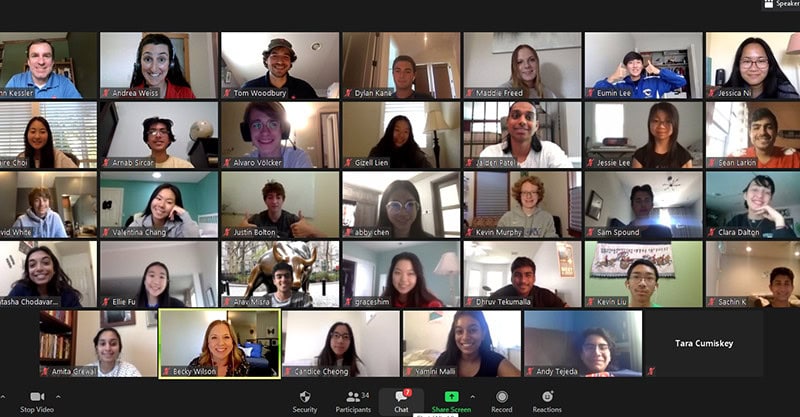
Starting in late March, as college campuses and hotels scheduled to host TFAS high school programs began closing and cancelling in-person programming, TFAS quickly determined that we would need to pivot to offer virtual programs in order to fulfill our vital mission and reach young minds with the “the economic way of thinking.”
Fortunately, TFAS high school division, the Foundation for Teaching Economics (FTE), already had experience with online learning, so adapting to the new COVID-19 virtual learning environment was seamless.
Chase, a student who participated in the program in August called Economics for Leaders “a fantastic program that really broadened my understanding of economics and inspired me to want to learn more outside of the classroom.”
By the start of summer, TFAS launched a fully-virtual version of the Economics for Leaders student program for high school sophomores and juniors. It soon became clear that the inability to host in-person events due to closures and travel restrictions became a catalyst for more creative programming, rather than a hindrance.
Despite the changes, enrollment numbers for high school programs were on par with the previous year. As a result of this shift, staff anticipated that enrollment numbers would drop by 50 to 60 percent. However, the results surpassed all expectations. 620 students completed programs this summer, only 31 fewer than the number of students completing in-person programs in 2019. Attrition, which tends to be an issue with online learning, was less than 1%.
FTE Executive Director Ted Tucker reported that these programs overcame concerns that online education might not rise to the challenge of maintaining student engagement.
“One proxy for student engagement is the level of attrition and no-shows. While many school districts reported significant no-shows this past spring, our attrition rate was less than 1%. Of the 620 students enrolled in our virtual summer economics courses, only two dropped out.”
Student participant evaluations were overwhelmingly positive, with comments from students such as, “I thought the program was an exceptional example of how to run an online class.”

The program’s rapid pivot to an online-only approach focused on maintaining effective interactive pedagogy. Instead of offering a fully asynchronous format, which limits student interaction, FTE created highly interactive “live” weeklong synchronous courses, where students could build community, interact and learn from peers as well as instructors. Through the creative use of the Zoom web conferencing platform, as well as the interactive applications Pear Deck and MobLab, instructors recreated FTE economics activities for the virtual classroom.
Through these interactive week long programs, students better learned economic concepts such as supply and demand, opportunity cost, free trade and market conditions and external influences.
EFL student Amita said the program not only allowed her to open her eyes to new these economic ideas, but it also allowed her to develop new leadership skills.
“Economics for Leaders has provided me with the opportunity to engage in and learn further about not only economics, but myself as a leader,” she said. “This week has truly been a refreshing course, due to the informative content taught by amazing teachers and discussions with other curious and like-minded classmates who are eager to learn more.”
This new online program format has the potential to expand FTE’s reach in the upcoming year. Although not a replacement for the in-person EFL program, the flexible schedule of the virtual format may appeal to students who otherwise would not enroll in an in-person program.
Learn more about FTE Economics for Leaders 2020 programs in our mid-summer check in story at TFAS.org/EFL20Update.

